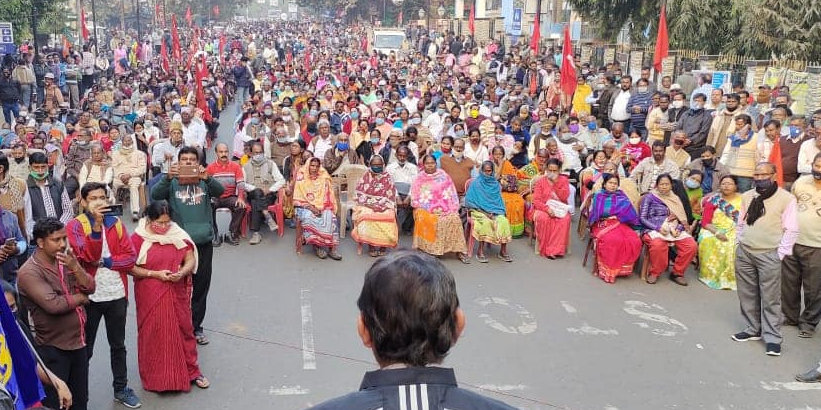By B Prasant
As I move away from the massive kisan (farmers and peasants) assemblage at the Singhu border between the province of Haryana and Delhi, a heavy drizzle starts to add to my misery in the bone-chilling cold of late Indian winter. I plan to drive along several narrow link roads to gain access to the otherwise blocked NH 44 highway, and then to move into the city en route to the airport.
Soon I have to stop as the car is surrounded by several dozen Sikh kisan. They come bearing not only pennants, flags and festoons as souvenirs of my stay, but touchingly, pots of home-cooked food: they remain curiously bare-chested even as the icy rain persists.
Asked why, their aged mukhiya (village head) informs me that the entire gathering would sing and dance in the fierce wintry downpour and shout slogans for a couple of hours to show the jan-virodhi (anti-people) Modi government that “even nature could not cow them down.”
This is the spirit of the half-a-million-odd agitators who have travelled from the vast fields brimming with rice, wheat, millet and sorghum, to block the national highways linking New Delhi to Haryana and the Punjab at Tikri, Singhu, Jhatikara, Jharoda, Chilla and Dhansu. The capital is now effectively cut off from the north and the west of the country.
The kisans have come on foot and riding thousands upon thousands of big tractors with trailers full of cereals and vegetables. “We shall be able to survive for at least six months at the border,” informed one of the leaders of the 500-odd kisan and khet-mazdoor (agricultural workers) unions who have mobilized.
They appear set for a long stay. Living quarters have been built, food kitchens are in full swing and impromptu cultural programs are run every evening. Sanitation is being well taken care of and a defence perimeter with high barbed wire fences has been erected at every point to counter the police barricades.
Farmers’ unions led by the Communist Party of India (Marxist) play a crucial organizational role in motivating the movement, but this is a kisan movement. I found it difficult to label it ideologically – and herein may lie an important key to the ultimate stability and fate of this gigantic struggle.
The kisan agitation is directed against four neoliberal legislative proposals of the Modi government, all of them farmer-related and all of them anti-people to the core. The bill on trade in farm produce seeks to do away with the crucial regime of Minimum Support Price (MSP), which keeps the farmers viable in the face of price fluctuations and market instability as well as natural calamities. The bill also does away with the regulating power of the registered rural markets or mandis.
The ordinance on farm services and price-fixing dismantles the age-old practice of informal and flexible contract farming that has historically developed as a situation-specific instrument benefitting both the farm-owners and the contract farmers. The change facilitates the entry of big capital, domestic and foreign, right into the agricultural sector with minimal state intervention. The private players would be under no obligation to adhere to any price-fixing schedule.
The essential commodities amendment removes cereals, pulses, oilseeds, edible oils, onion and potatoes from the list of essential commodities. It will also deregulate the production, storage, movement and distribution of these foods. More than anything else, this act is sure to jeopardize the country’s hard-earned food security, while exposing farmers to market forces without state protection.
All three farm-related acts nullify the power of state governments to intervene in the farm sector, even in times of contingency. The instruments will also permanently blunt the bargaining power of farmers.
The fourth bill weakens the powers over distribution of electricity, which state governments presently enjoy. It will clamp a ban on all subsidized rates (to farmers, for example) and allow all electricity generation units nationwide to appoint private sector companies for distribution and rate-fixing, particularly affecting the poor and marginal population of the country.
How has the Modi government reacted to the farmers’ agitation? Initially there were baton charges, use of water cannon, arrests and intimidation. When the farmers simply shrugged off the aggression, the police erected stone-barriers on all points of ingress into the capital and waited. The farmers dug in and an impasse developed.
Modi faces the horns of a dilemma. Every day that the agitation continues, the central government loses face. Since the general strike on December 8, a few of the smaller political outfits in the BJP-led alliance have withdrawn their support for the government. More may well follow suit.
Every Indian political party having secular-democratic credentials has come forward to lend support to the farmers’ struggle. Communist and socialist parties across the globe have communicated solidarity with the movement. The country in general remains sympathetic to the farmers’ cause.
On the other hand, maintaining the cadence of the movement for a long period is a challenge before amorphous collective of the farmers’ unions. We have to remember that the fray includes associations representing large farmers – and in considerable number – who have long supported the Modi government.
Following the failure of the latest round of talks with the central government, the farmers have called for a march on parliament on India’s Republic Day on January 26. Both the Modi government and the farmers’ unions appear to be prepared for a “final” show-down. A comprehensive popular victory will require converting the farmers’ movement into a countrywide struggle, and soon.
[hr gap=”10″]
Get People’s Voice delivered to your door or inbox!
If you found this article useful, please consider subscribing to People’s Voice.
We are 100% reader-supported, with no corporate or government funding.




